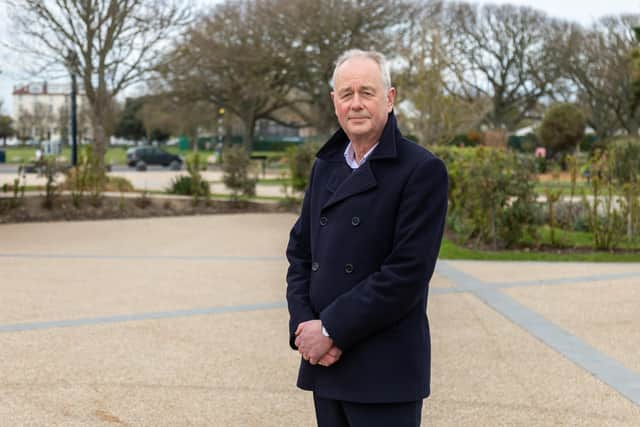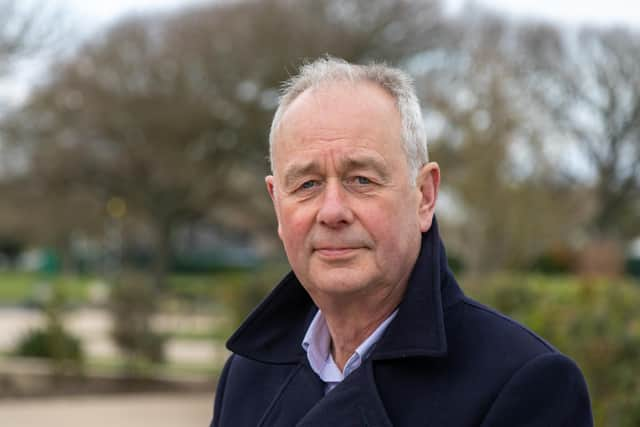Royal Navy veteran says Falklands War experience ‘stays with you forever’ as he remembers lost friends and colleagues 40 years after the conflict
and live on Freeview channel 276
Adrian Bell’s career in the Royal Navy spanned three decades, during which time he commanded three warships and concluded with command of British Forces in Gibraltar.
But in 1982, then 20-year-old Adrian had only been in the navy for 18 months.
Advertisement
Hide AdAdvertisement
Hide AdThe Gosport resident said: ‘I’d been sent to university and decided to drop out, much to the displeasure of the navy, actually.


‘We ended up getting transferred to one of the five trawlers that the navy took up from trade, they were actually commissioned as warships. Mine was HMS Northella.
‘We were sent down in the first instance to do the minesweeping, because it was feared the Argentinians were laying mines around the islands.
‘We ended up doing all sorts of logistics, moving soldiers around, moving ammunition around, moving food around - you name it, we carried it, because we had big decks to take all sorts of stuff on.’
Advertisement
Hide AdAdvertisement
Hide Ad

Even though he was a young man, Adrian was given important responsibilities to oversee.
‘I was the Midshipman, I was the fifth hand, the watchkeeper on the bridge, and I was also the mate of the upper deck,’ he remembered.
‘So when we were doing all the moves that we were doing, and we offloaded troops off the Queen Elizabeth, we transferred ammunition and those sorts of things - everything that went on and off the decks, I was in charge of the team for doing that. We worked together, and that was really exciting, interesting work.
‘Then preparing to do the minesweeping, but we didn’t do that until after the conflict was over.’
Advertisement
Hide AdAdvertisement
Hide AdThis, Adrian said, was ‘really quite a weird experience’: ‘After various briefings, including from the Argentinians who had actually been responsible for laying the mines, we went off to sweep the mines. That took us a couple of weeks.’
Adrian remembers this period of his life as ‘quite an experience’, remembering some moments with sadness and some with affection.
He added: ‘I think I learned more, in that short time, than I think I learned at any other time in my career.
‘It probably helped me develop into the sort of person I became in the navy, and broader than that, because I think you learn a lot about yourself, a lot about others, a lot about fear.
Advertisement
Hide AdAdvertisement
Hide Ad‘You learn about excitement, you learn about leadership, you learn about planning, and experiencing the highs and lows that go with that.
‘I’ll never, ever, ever forget the day that it all became serious, and stopped being a sort of Boy’s Own adventure, as it were.’
This moment for Adrian was when Royal Navy warship HMS Sheffield was hit on May 4, 1982, killing 20 personnel.
‘That suddenly brought home to us all that this was a serious conflict,’ Adrian recalled.
Advertisement
Hide AdAdvertisement
Hide Ad‘It all felt a bit unreal and then suddenly, it became absolutely real, and I think that moment, and the days, weeks, months afterwards were quite a revelation.’
On his departure from the UK, Adrian remembers asking himself if he would ever see his country again.
He said: ‘I had, the previous year, been on HMS Glamorgan, and of course that got hit.
‘A close friend, Lieutenant Dave Tinker, the captain’s secretary, was killed in that. And that never leaves you.’
Advertisement
Hide AdAdvertisement
Hide AdAdrian remembers fondly the people he worked with, because they became ‘so deeply bonded’ during their service together.
He said: ‘That is a great pleasure, that those sorts of friendships last over that very long period.’
Now, Adrian is the chief executive of the Royal Navy and Royal Marines Charity, which he joined in 2018.
He said: ‘We’re there to serve the people of the Royal Navy and Royal Marines past and present.
Advertisement
Hide AdAdvertisement
Hide Ad‘In doing that, what we’re about is helping to alleviate the consequences of service, and also honouring that service to the nation.’
Reflecting back on his experiences of the Falklands conflict 40 years later, Adrian says he believes remembering the war - and the reasons we went to fight - is ‘very important’.
He said: ‘It’s something that reminds us - as if we needed reminding today, with a war going on in Europe - about the brutality of war.
‘You don’t take decisions to go to war lightly. Once you’re committed to those things, who knows what’s going to happen.
Advertisement
Hide AdAdvertisement
Hide Ad‘Force is there to be used, but appropriately and at the right time. Understanding that commitment to conflict is very important.
‘War is brutal in any respects, and there’s an added dimension when you’re at sea, especially so far away, is that when something happens, if you as a ship’s company can’t solve it, no one's going to come along and do it for you.’
Adrian can see parallels with the conflict in Ukraine, and says that it is important to remember that Britain became involved in the 1982 war to fight for ‘the right of the Falkland Islanders to be what they wanted to be.’
He said: ‘For another country to invade - and again, we’re seeing that in Europe today - is wrong.
Advertisement
Hide AdAdvertisement
Hide Ad‘That committal by the Argentinians to invade - something had to be done about that. If you ignore those things, then it just spreads further.
‘When I look back, I think - would I do it again? Yes, absolutely. Partly because it was the right thing to do, but also the experience was invaluable, but that is tinged with real deep sadness at the loss of friends, colleagues, and that stays with you forever.’
Comment Guidelines
National World encourages reader discussion on our stories. User feedback, insights and back-and-forth exchanges add a rich layer of context to reporting. Please review our Community Guidelines before commenting.

